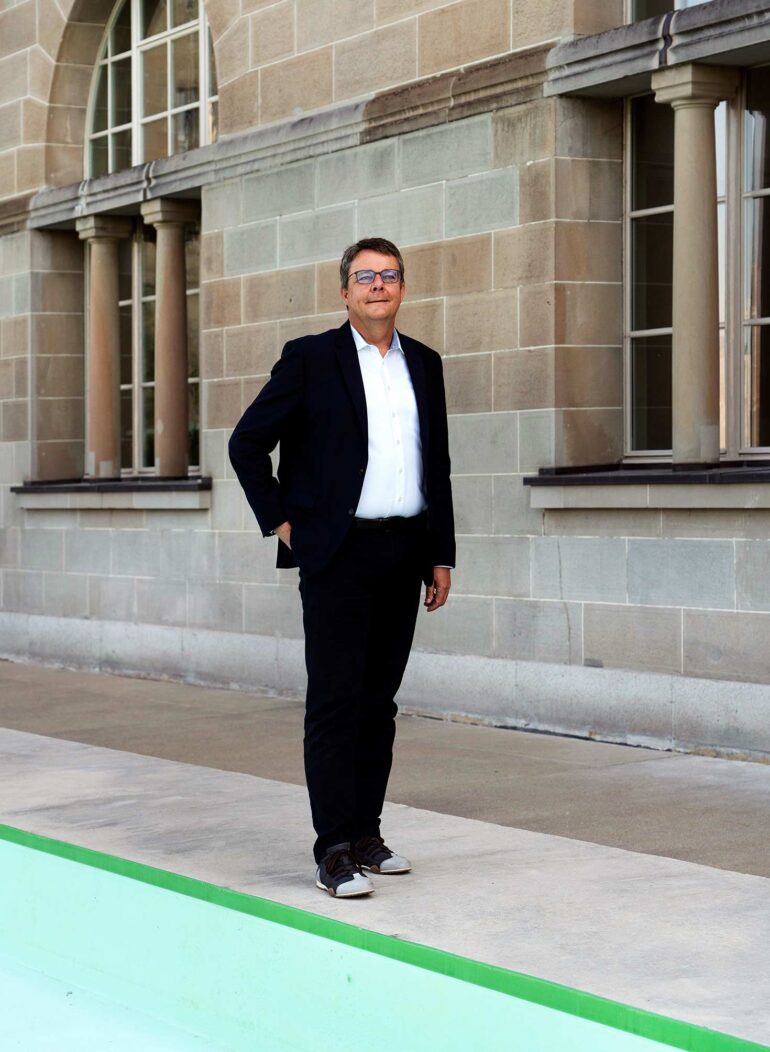The president of the University of Zurich, Michael Schaepman, talks about research funding, the advantages of a foundation and what it means now that Switzerland is no longer an associate member of Horizon Europe.
When you were a student, did you think about how research was funded?
When I started my studies, I was just amazed by the enormous scale of research. I spent less time thinking about how to fund my research. However, I realised immediately that the quality is really high for topics in which the university already held a competitive position, and there was plenty of funding for them. I found out about research funding when I took on responsibility as a professor and in my management roles, such as my function as president.
What is the significance of private funding?
Publicly funded universities will be underfinanced in the future. We have a structural problem: the number of students is increasing quicker than the funds available. In other words, we will need to think very carefully about how we fund our research in the future.
And this is where private donations help?
Private funding really has benefits: people want to donate money for a particular purpose, but these funds do not need to be earmarked for a particular area. A donor who wants to help support the environment can choose to engage in one of the many environment-related topics that UZH researches.
What are the advantages of the university’s own foundation, the UZH Foundation?
A practical reason is that it can accept and manage funds in a different way from the university, as an institution under public law. The foundation is home to bona fide fundraising experts. That’s to our benefit. They are able to raise funds on a sustainable level and manage the funds accordingly.
Why does the foundation also have sub-foundations?
Instead of managing all the various foundations separately, we came up with the idea of bringing them together under the umbrella of the UZH Foundation. This means that the money can be managed professionally and administration handled centrally.
Today, almost every university in Switzerland has their own foundation. Do they work together?
There are a large number of collaborations, particularly if we want to fund major infrastructure or large-scale projects. I think targeted collaborative work will be very important in the future.
The University of St. Gallen [HSG] funds half its overall budget from private sources. What’s the situation at UZH?
At UZH, the proportion of private funding is comparatively small. Unlike HSG, we are a ‘full-service university’, offering the full range of subjects. Funding from the canton and federal government makes up about 75% of our budget, with 25% being competitive third-party funds, as they are known. They come from the Swiss National Fund SNF, foundations, private individuals and EU programmes, and have seen the greatest increase until now.
With the collapse of the EU framework agreement, participation in Horizon is at risk. Will this have an impact on Switzerland as a location for research?
Switzerland was a fully associated third country for Horizon 2020, but this is not the case for its successor, Horizon Europe. This has tangible consequences: Swiss researchers are no longer able to submit projects within the EU. With the collapse of the framework agreement, Switzerland as a research location has been removed from European competition. The question is, who we are going to compete with now? Switzerland could choose any other country with which to launch a competitive research programme, but these countries have not exactly waited for us. Switzerland is currently alone in the research market, which is why we are losing our competitive edge across Europe. It’s not just our reputation that is lost, it’s also our collaboration with all kinds of researchers in the EU. And we are losing money, specific third-party funding, which also co-finances key infrastructure.
What’s next?
Last December, the Swiss parliament promised the money for Horizon Europe, and this money is in fact available. However, political action needs to be taken to release it. It’s important for those researchers who have already submitted a project because they need the security that they can continue with their work. Losing the funding for a year, or even two, would be a massive loss: we are talking about millions that would just vanish.
A state of limbo?
Exactly.
Are universities coming together so they can be heard?
Universities are doing all kinds of things. At present, the most important activity is developing an SNF safety net programme, designed to support researchers who have already started their project applications. They were taken out of competition at the time of writing.
And could foundations and private funds bridge the gap?
Money from foundations is very important, but it cannot bridge the gap that’s been created.
How loyal are UZH alumni?
UZH has a very strong alumni association. In 2020, we launched our pandemic fund at short notice and they topped it up with a sizeable sum, showing their connection to their alma mater. If we think about how many UZH students have become alumni, and are continuing to do so, there’s still room to grow and we can strengthen this connection further.
What does third-party funding mean for the university’s independence?
This independence is an exciting topic. Our uppermost goal is to undertake fundamental research that is as free from influence as possible. The university is most committed to ideas for projects put forward by our own researchers. We do not put them under pressure for projects to lead to products or bring tangible benefits – apart from an increase in knowledge.
Some donors have an idea of what they want to support…
We guarantee freedom of research at our institution: researchers will always be allowed to publish their results, and third-party support is not permitted to influence our strategy. If someone offers us money for a topic outside our research areas, we would turn it down: there’s no sense in becoming an opportunistic university. As a full-service university, we can offer topics that are guaranteed to be of interest to any donor!
Does a code of conduct set out how you use donations?
There are requirements that certain contractual conditions are non-negotiable for donations; for example, freedom of publication.
How about the transparency of donations?
As far as transparency goes, UZH is at the top of the table in Switzerland. We have a list of third-party funding that anyone can access, detailing every donation above CHF 100,000. It is possible for the organisation to remain anonymous if the client does not want to be named.
What about transparency for funded professorships?
All the chairs funded by foundations or private individuals can be viewed online in the list of endowed professorships.
As president, how much of your work is taken up with fundraising?
About half a day a week. However, there are grey areas at events where I represent the university externally and also speak to donors at the same time. UZH employs about 800 professors and they handle their own marketing. They approach potential funders independently, spreading our fundraising across a broad basis.
Is the money pooled together in the UZH Foundation?
Yes.
«We guarantee freedom of research.»
Michael Schaepman, president of the University of Zurich
The younger generation’s work is shaped by a greater sense of collaboration and participation. Have you picked up on this shift at the university?
Yes. Today, many more people work collaboratively, in large consortia. How people undertake research has undergone a fundamental transformation in many subjects. Today, more work happens collaboratively, with people thinking in a more community-minded way. We are also responsible for ensuring our graduates receive a good, modern education. After all, they would not find a job in the world of business if we just let them work quietly in a corner.
As a professor, you spent many years as a researcher. Do you miss it?
I really do. The role of president is a full-time position, but my research has not been completely laid to rest. I gave up my professorship, but the research group still exists. If I step down or if I’m not re-elected, I could return and continue my research…
…and dive back into your specialist area.
(Laughs). Now, my specialist area is the entire university and its 9,000 employees, plus the knowledge about which of the university’s issues are relevant to the outside world.
So, in other words, you’re researching the university?
To a certain extent, yes, I am. It’s utterly fascinating: I can get a glimpse of any area I like and I’m amazed every day by the sheer range of topics that people research at such a high level at UZH. It’s simply wonderful.




